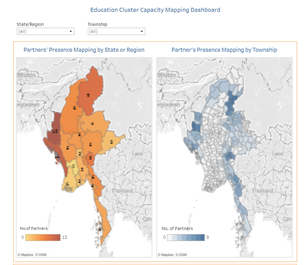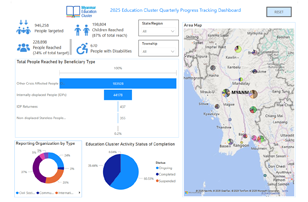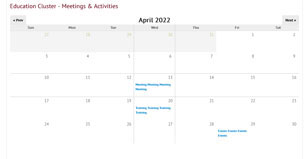Myanmar Education Cluster
Education is a fundamental human right for all and is particularly critical for children and youth affected by conflict and disasters. A coordinated education response, bringing together all actors – UN agencies, NGOs, CSOs and local partners – is essential to ensure all children and youth affected by crises in Myanmar have access to protective, quality education opportunities.
The Education Cluster website includes all EiE events, activities, meetings and resources in an effort to foster collaboration and share best practices across different actors, sectors, clusters and AoRs.
Education Cluster Dashboards
Education Cluster Capacity Mapping Dashboard
2025 HNRP Dashboard
Education Cluster Meetings Calendar
Key Contacts
Cluster Coordinator: Catherine Mercy - [email protected]
Cluster Coordination Specialist: Harry Aung - [email protected]
Information Management: Hnin Su Wai - [email protected]
Sub-national Coordinators:
- Northwest Education Cluster (Chin excl. Paletwa, Magway, Mandalay, Sagaing):
- Northeast Education Cluster (Kachin, Northern Shan):
- Rakhine Education Cluster (Rakhine, Southern Chin - Paletwa):
- Southeast Education Cluster (Eastern and Southern Shan, Kayah, Bago, Kayin, Mon, Tanintharyi):
Core Documents
| File | Format | Size | Upload Date |
|---|---|---|---|
| Myanmar Education Cluster Strategy 2022-25 |
pdf |
3.03 MB | 27-Apr-2022 |
| Myanmar Humanitarian Response Plan 2022 |
pdf |
21.7 MB | 27-Apr-2022 |
| Myanmar Humanitarian Needs Overview 2022 |
pdf |
23.06 MB | 27-Apr-2022 |
Sub-National Clusters
The Education Cluster currently has six active Sub-National Coordination Groups. These groups coordinate responses in the following States/Regions: Chin, Magway, Sagaing, Rakhine, Kachin, Shan, Kayah, and the Southeast (Kayin, Mon, East Bago, and Tanintharyi).
Rakhine
| File | Format | Size | Upload Date |
|---|---|---|---|
| EiE Sector Standards Rakhine |
pdf |
165.05 KB | 27-Apr-2022 |
Kachin
| File | Format | Size | Upload Date |
|---|---|---|---|
| Kachin Contingency Plan |
pdf |
375.62 KB | 27-Apr-2022 |
Southeast
| File | Format | Size | Upload Date |
|---|---|---|---|
| Southeast Contingency Plan |
pdf |
391.42 KB | 27-Apr-2022 |
Meetings, Updates and Presentations
| File | Format | Size | Upload Date |
|---|---|---|---|
| October National Coordination Meeting Agenda |
docx |
33.05 KB | 16-Nov-2022 |
| September National Coordination Meeting Agenda |
docx |
33.4 KB | 16-Nov-2022 |
| August meeting agenda |
docx |
32.05 KB | 02-Sep-2022 |
| July Meeting Agenda |
docx |
32.41 KB | 04-Aug-2022 |
| June Meeting Agenda |
docx |
31.54 KB | 30-Jun-2022 |
| May Meeting Agenda |
docx |
31.76 KB | 25-May-2022 |
| File | Format | Size | Upload Date |
|---|---|---|---|
| April Meeting Agenda |
docx |
31.78 KB | 27-Apr-2022 |
Education Resources & Technical Guidelines
| File | Format | Size | Upload Date |
|---|---|---|---|
| Inclusive Education Resources |
pdf |
3.73 MB | 27-Apr-2022 |
Reference Links
Useful Resources from Other Sectors, Clusters & AoRs
GBV
Please find below a number of helplines/hotlines which can be used in cases of gender-based violence.
- A Pyone Pan helpline: helpline service, legal aid and referral support to women and girls with disabilities across Myanmar. Sign language interpretation is provided to survivors with hearing impairments. The helpline is operational from Mon-Sat, 9am-5pm, and can be reached via phone on 09-765 777 890, 09-959 777 890, Viber on 09-426 777 890 (sign language interpretation) or through Facebook. More information can be found under this link.
- Nar Htaung Pay Mal Naw hotline: provides GBV case management, PSS, livelihood and referral support for women and girls across Myanmar. The hotline is operational 7 days per week, from 9am-12pm and can be reached on 09-777 206035 (Mon-Fri, 9am-4pm), 09-889 5705 86 (Mon-Fri, 4pm-12pm), 09-765 149 411 (Sat-Sun, 9am-12pm). The hotline can also be contacted through Facebook.
- 24-hour justice hotline provides legal advice, consultation and legal information related to legal rights and access to justice for children (long code – 09-776555554; short code – 5554).
- Phone Khaw Lite Par helpline: helpline that provides basic emotional support, information sharing, safety planning and referral support to women and girls across Myanmar. The helpline also provides services in ethnic languages besides Burmese such as Rakhine, Chin, Kayin (Poe), Kayin (S'Gaw), Kachin and Pa'O as per the schedule below. The helpline can be reached on 09-789122649, daily from 9am-9pm. More information can be found under this link.
| Languages available | Date | Time |
| Rakhine | Wednesday | 3:00 PM -6:00 PM |
| Chin | Saturday | 9:00 AM -12:00 NOON |
| Kayin (Poe) | Friday | 9:00 AM -12:00 NOON |
| Kayin (S’Gaw) | Saturday | 12:00 – 3:00 PM |
| Sunday | 3:00 PM -6:00 PM | |
| Kachin | Saturday | 3:00 PM -6:00 PM |
| Pa’O | Saturday | 3:00 PM -6:00 PM |
CHILD SAFEGUARDING
The Global Education Cluster (GEC) has announced the launch of a new self-paced training module on “Child safeguarding in coordination with the GEC and other Clusters/ AoRs”. The 50-minute e-learning module introduces child safeguarding; it clarifies the differences between child protection and PSEA, it also explains why and how Education Clusters and EiE Working Groups can embed child safeguarding in their coordination functions. It provides an overview of child safeguarding organizational responsibilities of individual Cluster Partners. This module is primarily aimed at Education Cluster/EiE Working Group Coordination teams but is also relevant and recommended by UNICEF and the GEC to other Clusters/AoRs/Sectors.
If you are interested, please access the online training for free on AGORA (UNICEF Learning site) in English here: https://agora.unicef.org/course/info.php?id=34857
Please do consider sharing within your organization and encouraging staff to complete the module (again, only 50 minutes are required).
MINE ACTION
This is the free interactive Mine Risk Education training for Myanmar. The training takes around 50 minutes and takes you through key messages on how to stay safe and prevent death and injuries from landmines, unexploded ordnance and other explosive devices in affected areas. You will also learn how to recognize dangerous and suspicious items and areas; what to do if you see suspicious items or areas and learn what might happen if you do not follow safe ways.
So for you and your family’s safety, you can learn about explosive and their dangers, do’s and don’ts, in this training. Therefore, please pay attention to the messages and carefully go through the activities.
The content of this interactive MRE application has been built around the five key messages which are central to the MRE storyboard and other components of the MRE toolkit, designed in 2015.
NOTE: The app is based on a direct English audio translation of the original MRE Myanmar Application which was developed in Myanmar language. Consequently, you will see some synchronization errors between images and sounds. This version of the application has only been translated to provide an English overview of the original content.
If interested, please download the application from the following links:
https://play.google.com/store/apps/details?id=com.NGO.MREEnglish&hl=en
https://apps.apple.com/us/app/mre-myanmar-english/id1474917221
Posters for Mine Action in Myanmar Language can be downloaded in the following link:
https://www.mediafire.com/folder/5y9ucf4cne8ac/EORE_Tools_2022
What is the AMRF?
The Access Monitoring and Reporting Framework (AMRF) is a global OCHA tool to collect and analyze data on the impact of access constraints on the humanitarian response. The AMRF logs incidents where access has been constrained, and their impact on the humanitarian response. See documents attached - AMRF Explanation for Partners



